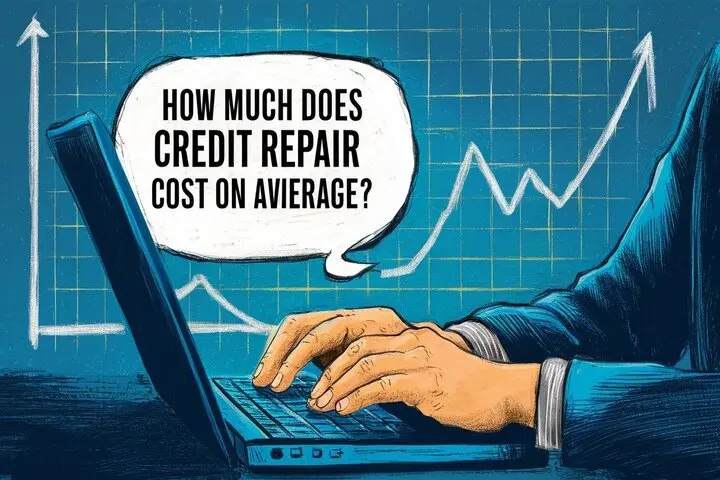A good credit score is essential for financial well-being. It influences everything from loan interest rates to insurance premiums, and even employment opportunities. When your credit score is less than ideal, credit repair might seem like an attractive solution. But before you jump in, it's crucial to understand the costs involved. This comprehensive guide will break down the average cost of credit repair, the factors that influence pricing, and how to make informed decisions about your credit health.
Understanding Credit Repair and Why It Matters
Credit repair involves challenging inaccuracies and outdated information on your credit reports to improve your credit score. This process can include disputing errors, requesting validation of debts, and negotiating with creditors. A better credit score opens doors to better financial opportunities, including:
- Lower interest rates on loans and credit cards
- Easier approval for mortgages and auto loans
- Better insurance rates
- Increased chances of renting an apartment
- Improved job prospects
While you can certainly attempt credit repair on your own (DIY credit repair), many individuals opt for professional assistance to navigate the complexities of the credit reporting system. This convenience comes at a cost, and understanding that cost is critical.
Average Cost of Credit Repair Services
The cost of credit repair services varies widely depending on the company, the services offered, and the complexity of your credit situation. There isn't a single, fixed price. However, we can look at typical pricing models and averages to give you a clearer picture.
Common Pricing Models Used by Credit Repair Companies:
- Monthly Fees: This is a common structure where you pay a fixed monthly fee for ongoing services. This fee can range from $79 to $149 per month, or even higher depending on the company and the level of service. This model is predictable, but it's important to consider that you'll continue to pay the fee until you cancel the service, regardless of progress.
- Pay-Per-Deletion: With this model, you only pay for items successfully removed from your credit report. The price per deletion can range from $50 to $150 per item. This can be a cost-effective option if you only have a few inaccuracies to address. However, some companies may charge a higher price for more complex deletions.
- Setup Fees: Many companies charge an initial setup or consultation fee, typically ranging from $50 to $200. This fee covers the initial review of your credit report, the development of a personalized strategy, and the setup of your account. Be wary of companies that charge excessively high setup fees.
- Package Deals: Some companies offer bundled services at a discounted rate. These packages might include credit report analysis, dispute letters, creditor negotiations, and ongoing monitoring. The price of these packages can vary widely depending on the services included.
Estimating the Total Cost:
To estimate the total cost of credit repair, consider the following factors:
- Number of Inaccuracies: The more inaccuracies or negative items on your credit report, the more work will be required, and the higher the cost may be, especially with pay-per-deletion models.
- Complexity of Issues: Simple errors like incorrect addresses are easier to fix than complex issues like charge-offs or bankruptcies. More complex issues may require more time and expertise, increasing the cost.
- Length of Service: Credit repair is not a quick fix. It can take several months to see significant results. With monthly fee models, the longer you use the service, the more you'll pay.
Example Scenario: Let's say you choose a company with a monthly fee of $99 and an initial setup fee of $100. If you use the service for six months, your total cost would be $100 (setup) + ($99 x 6) = $694.
Important Note: It's illegal for credit repair companies to charge you upfront fees before they have actually performed any services. Be extremely cautious of companies that demand payment before doing any work.
Factors Influencing Credit Repair Costs
Several factors can influence the overall cost of credit repair services. Understanding these factors will help you make a more informed decision when choosing a credit repair company.
Company Reputation and Experience
Established companies with a proven track record may charge more than newer or less reputable firms. However, paying a slightly higher price for a reputable company can be worth it, as they are more likely to deliver results and avoid unethical practices.
Level of Service and Expertise
Some companies offer basic credit repair services, while others provide more comprehensive support, including personalized credit counseling, debt management advice, and assistance with rebuilding credit. The more comprehensive the service, the higher the cost is likely to be.
Geographic Location
The cost of living in your area can also influence credit repair prices. Companies in major metropolitan areas may charge more than those in smaller towns or rural areas.
Complexity of Your Credit Issues
As mentioned earlier, the complexity of your credit issues will significantly impact the cost. If you have a long history of delinquencies, bankruptcies, or other serious credit problems, it will take more time and effort to address them, increasing the cost of credit repair.
DIY Credit Repair vs. Hiring a Professional
Before hiring a credit repair company, consider the alternative: DIY credit repair. While it requires time and effort, DIY credit repair is free (aside from the cost of postage and potentially obtaining your credit reports). You can:
- Obtain your credit reports from AnnualCreditReport.com (free once per year from each of the three major bureaus: Equifax, Experian, and TransUnion).
- Carefully review your credit reports for errors, inaccuracies, and outdated information.
- Draft and send dispute letters to the credit bureaus, providing evidence to support your claims.
- Follow up with the credit bureaus to ensure your disputes are being processed.
When to Consider DIY Credit Repair:
- You have the time and patience to dedicate to the process.
- Your credit issues are relatively simple and straightforward.
- You are comfortable communicating with credit bureaus and creditors.
When to Consider Hiring a Professional:
- You don't have the time or patience to dedicate to the process.
- Your credit issues are complex or overwhelming.
- You are unsure of how to navigate the credit reporting system.
- You want the expertise and guidance of a professional.
Avoiding Credit Repair Scams
Unfortunately, the credit repair industry is rife with scams. It's essential to be cautious and do your research before hiring any credit repair company. Here are some red flags to watch out for:
- Upfront Fees: As mentioned earlier, it's illegal for credit repair companies to charge upfront fees before performing any services.
- Guarantees of Results: No credit repair company can guarantee specific results. Credit repair is a process, and outcomes depend on the accuracy and validity of the information on your credit reports.
- Requests for Your Social Security Number or Bank Account Information Upfront: Reputable companies will not ask for this information until you have signed a contract and agreed to their services.
- Pressure Tactics: Be wary of companies that pressure you to sign up immediately or make unrealistic promises.
- Claims They Can Remove Accurate Information: Credit repair companies can only challenge inaccurate or outdated information. They cannot legally remove accurate information from your credit report.
- Lack of Transparency: A reputable company will be transparent about its fees, services, and processes.
How to Choose a Reputable Credit Repair Company:
- Research and Read Reviews: Look for companies with positive reviews and a good reputation. Check with the Better Business Bureau (BBB) for complaints.
- Check for Licensing and Accreditation: Some states require credit repair companies to be licensed.
- Ask for a Detailed Explanation of Services: Ensure you understand exactly what services the company will provide and how they will approach your credit repair.
- Get a Written Contract: A reputable company will provide a written contract outlining the fees, services, and cancellation policy.
- Understand Your Rights: You have the right to dispute errors on your credit reports yourself, and you have the right to cancel your contract with a credit repair company within three days.
The Bottom Line: Is Credit Repair Worth the Cost?
Whether or not credit repair is worth the cost depends on your individual circumstances. If you have significant inaccuracies on your credit reports and are struggling to navigate the credit reporting system on your own, hiring a reputable credit repair company might be a worthwhile investment. However, if your credit issues are relatively minor, or you are comfortable with the DIY approach, you may be able to save money by handling the process yourself.
Carefully weigh the costs and benefits before making a decision. Remember to do your research, avoid scams, and understand your rights. Ultimately, improving your credit score is a long-term investment in your financial future.











